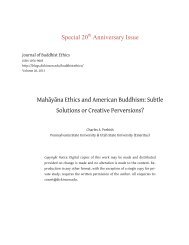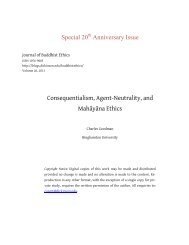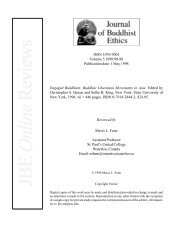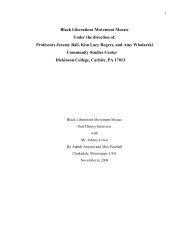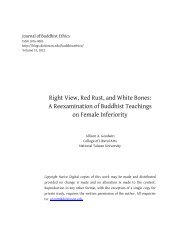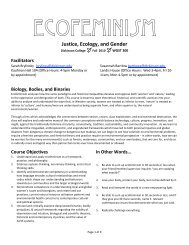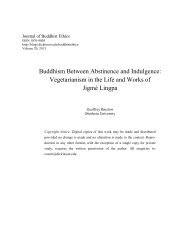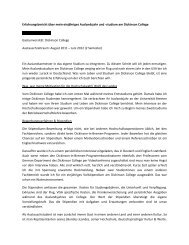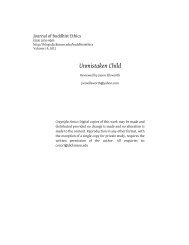Read article - Dickinson Blogs
Read article - Dickinson Blogs
Read article - Dickinson Blogs
Create successful ePaper yourself
Turn your PDF publications into a flip-book with our unique Google optimized e-Paper software.
PRECEPT-TAKING AND MORALITY<br />
This raises the question, though, of whether it is worse to do<br />
an unwholesome action when i) one has formally undertaken not to do<br />
so, or ii) when one has not so undertaken. If one undertakes the<br />
precept of not stealing, this must be because one recognises that such<br />
an action is unwholesome. If one then breaks the precept, while one<br />
does not do so in ignorance of what is right and wrong (as in v),<br />
above), one is also breaking a promise: not to steal. Unless this is a<br />
premeditated lie, though, it perhaps does not outweigh the goodness of<br />
the original promise/resolution to avoid stealing. As expressed by<br />
Tatz, "To act morally in accordance with a vow is considered more<br />
beneficial than to act morally without one, because the moral conduct<br />
Harvey.txt Page:149<br />
is associated with progress toward a higher goal". [5] To break a<br />
moral precept which one is generally seeking, and succeeding, to<br />
follow, would thus be better than to go against one that one has not<br />
formally undertaken.<br />
What, though, of the many monastic rules undertaken by a monk<br />
or nun, but not by a lay-person? The most obvious one of these is the<br />
avoidance of all sexual activity. Sexual activity is acceptable for a<br />
lay-person, provided it is within certain moral bounds. A monk<br />
undertakes to avoid it, as a crucial part of his training to overcome<br />
all greed/attachment, hatred and delusion. Any act of sexual<br />
intercourse will then lead to "defeat" in the monastic life, and<br />
expulsion from it. In this case, it is seen as better not to take the<br />
relevant precept, by remaining a lay-person, or disrobing, than to<br />
take it and then break it. This is partly because of the solemnity of<br />
the monastic vows, and the obligation a monk has to make himself<br />
worthy of the alms of the lay-people who support him, and so not<br />
betray their faith. One could also say that sexual activity is not<br />
itself immoral, so it only becomes blameworthy if indulged in after<br />
vowing not to do so (or if done in a way involving suffering to<br />
others). Here, a useful distinction is made by Asa"nga: between the ten<br />
unwholesome courses of action (above), which are "reprehensible by<br />
nature", and most of the monastic rules, which are "reprehensibly only<br />
'by precept'", as breaking them brings no direct harm to others. [6]<br />
Likewise, the //Abhidharma-Ko"sa// (IV.122bc) says that some things<br />
are not immoral, //dauh"siilya//, but are prohibited by the Buddha for<br />
monks, for example eating after noon.<br />
Another potentially problematic issue is the case, for<br />
example, of a person who steals so as to feed his starving mother.<br />
This would be seen as an act which is a mixture of bad and good, in<br />
which the good aspect helps counterbalance the bad, especially if the<br />
theft is done in recognition of the wrongness of stealing. Buddhism<br />
acknowledges that poverty in a society makes theft more likely<br />
(D.I.76-7). While poverty does not excuse theft, it can be seen to<br />
make it less blameable.<br />
CONCLUSIONS<br />
The perspective of early Buddhism views morality as part of a<br />
spiritual path which largely consists of cultivating a more wholesome<br />
character: by undermining moral/spiritual defilements and cultivating<br />
counteractive virtues. This process of--generally gradual-transformation<br />
is seen to culminate in a state of liberation from all<br />
traces of greed/attachment, hatred and delusion, and their consequent<br />
suffering, through the experience of Nirvana. Such a vision assumes<br />
http://www.buddhistethics.org/2/harvey.txt<br />
9 of 11 4/5/2010 12:17 PM



